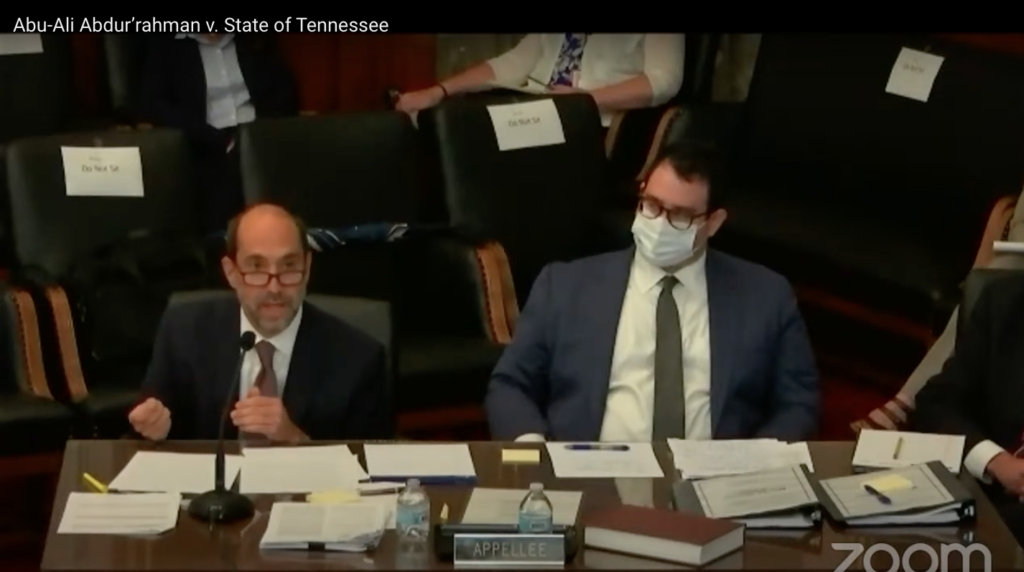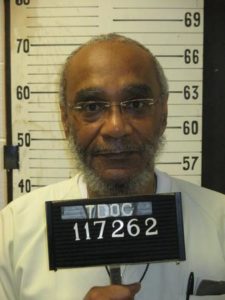
An agreement that spared the life of a man on death row could transform the future of death penalty cases in Tennessee. Judges raised concerns about the settlement during a Court of Criminal Appeals hearing Tuesday morning.
The central question in this case is whether Nashville District Attorney Glenn Funk had the power to intervene when he exchanged Abu-Ali Abdur’Rahman’s death sentence for life in prison. Funk agreed last summer that the prosecutor at the original trial violated Abdur’Rahman’s constitutional rights when he barred several black people from serving on the jury.
The DA didn’t say at the time that he thinks Abdur’Rahman isn’t guilty of participating in a stabbing that left a man dead and his girlfriend wounded. But Funk said that prosecutorial misconduct at trial raises questions about his sentence.
“Overt racial bias has no place in the justice system,” Funk said in court last August. “Further, and most importantly, the pursuit of justice is incompatible with deception. Prosecutors must never be dishonest or mislead defense attorneys, courts or juries.”
But if Funk could overturn one death sentence, Judge Robert Holloway asked during Tuesday’s live-streamed hearing, what would stop a “rogue prosecutor” from doing away with all the death penalties in their court?
 Courtesy Davidson County District Attorney's office
Courtesy Davidson County District Attorney's office Abu-Ali Abdur’Rahman was sentenced to death in 1987 for first-degree murder. Tennessee’s attorney general is appealing a decision to overturn his sentence in exchange for life imprisonment.
Even one of Abdur’Rahman’s lawyers, David Esquivel, said he understands why the court and state attorney general’s office would find that “troubling.” But, he countered, voters trust DAs and trial judges to make such decisions carefully — otherwise, they face consequences.
“The prosecutor and the judge, in particular, are ultimately subject to the ballot box. And that is a well-established, foundational principle of our government and society,” Esquivel said. “If we have a district attorney who is acting inconsistent with the interests of his constituents in the state of Tennessee, then the remedy is to vote him out of office.”
But the attorney general’s office argued that only the governor has the right to commute a death sentence, so Funk didn’t have the authority to sign the order overturning Abdur’Rahman’s sentence. Allowing the settlement to go forward, state attorney Zachary Hinkle said, could threaten “the orderly administration of justice.”
“What we are presenting to you, and what we believe this case involves, is a fatal jurisdictional flaw that creates a very significant question about the validity of this order, which ultimately impacts a pending Supreme Court order setting an execution date,” Hinkle said.
Abdur’Rahman was convicted of first-degree murder and other charges in 1987 for fatally stabbing Patrick Daniels and injuring Norma Jean Norman during an armed robbery the year before. Abdur’Rahman has said that he “blacked out” during the incident, and his attorneys argue that Abdur’Rahman has suffered from mental illness since he was abused as a child, a mitigating factor they say wasn’t raised at trial.
When Abdur’Rahman agreed to the district attorney’s deal last summer, he waived his right to raise such concerns in future appeals. In return, his execution, which had been set for this past April, would be canceled.
Abdur’Rahman had been scheduled for execution three times prior — in 2002, 2003 and again in 2012. Each time, the case has continued to wind its way through the court system. Until the state appeals courts rules on the latest development in Abdur’Rahman’s case, his execution has once again been postponed indefinitely.
Samantha Max is a Report for America corps member.

